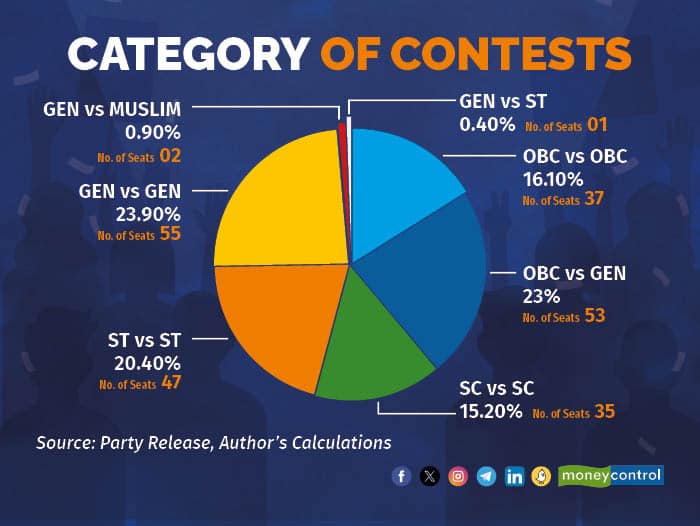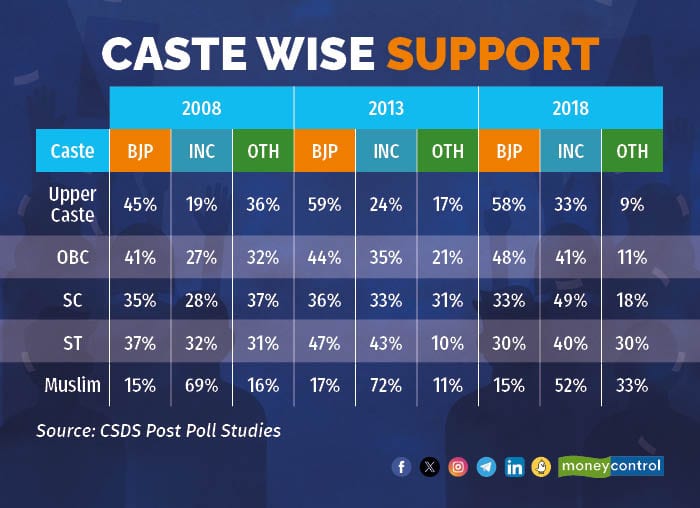



BJP and Congress have worked hard to get their caste balance right in the Madhya Pradesh election. Caste, whether we may like it or not, is the hard reality of Indian politics and the election system.
An Azim Premji University-CSDS survey tells us 55 percent of Indians prefer a politician from their caste, and this number in MP is very high at 65 percent. Both parties have released caste/category-wise distribution of tickets, caste plays an important role in selection of candidates.
MP’s Caste Landscape
Hindus account for 91 percent, Muslims 7 percent and other religious groups 2 percent of the population. MP is estimated to have around 50 percent OBC, 20 percent ST, 15 percent SC and 15 percent upper caste/general category population. The ticket distribution by Congress and BJP exhibit almost a similar pattern, with the saffron party sticking to its unstated policy of not giving any ticket to Muslim candidates.

In terms of head-to-head contests, OBCs are in contention in 39 percent of the seats, general category in 48 percent of the seats, and SC/ST in 35-36 percent of the seats. Muslims are vying for only 1 percent of the seats.

Few Castes Dominate, Inclusiveness Mere Rhetoric
Twelve caste groups have pocketed roughly two-thirds of tickets on both Congress and BJP lists, pointing to imbalances in representation. MP has roughly 500 caste groups in all.
Both the parties have given tickets to candidates from 51 caste groups, which is just 10 percent of the total number of caste groups in MP. Of course, it is impossible to accommodate every caste but the hard reality is that a few groups are cornering disproportionate representation.

Both parties have given the highest number of tickets to Brahmins and Thakurs, the most influential groups. Both Congress and BJP select their candidates from the same pool of influencers/elites/winnable candidates, despite the rhetoric on inclusiveness and token gestures made to smaller communities.
Anchor Voting Blocs Of BJP-INC
Upper castes and OBCs are anchor voting segments of the BJP. SC-ST and Muslims are the anchor voting segments for the Congress.
In 2008, the BJP was leading amongst all the caste/community groups against the Congress except for minorities. The lead amongst upper castes and OBCs was higher while amongst SC-ST voters slim.
Uma Bharti had floated her own party in that election and hence the support for Others showed a high number across caste groups. Her contesting alone actually helped the BJP as it split the opposition vote.
In 2013, a similar trend was visible: BJP increased its support amongst upper castes and OBCs as Uma Bharti made a gharwapsi. This led to a decline of “Others” support across caste groups, and a proportionate increase for BJP. In 2013, BSP had good influence among SCs in Bundelkhand and Gwalior - Chambal which would explain "Others” bagging 31 percent support in that election.

In 2018, BJP maintained support from upper caste and OBCs. However, Congress managed to close the gap amongst the OBCs from 14 percentage points in 2008 to 7 percentage points in 2018. Congress gained an upper hand amongst the SC-ST community leading by 10 percentage points among STs to 16 percentage points among SCs.
The SC-ST Atrocities Act issue had become a big talking point in MP in 2018, with Dalits and Adivasis backing the Congress, over their unhappiness with the Supreme Court diluting the law’s provisions, even though the BJP government at the Centre had nullified the same through a constitutional amendment.
The upper castes too were unhappy with the BJP for the amendment resulting in a Savarn Andolan across the state. So this acted as double whammy for the party.
OBCs The Focal Point
There is no dominant OBC caste in MP unlike Yadavs in Bihar and UP, Jats in Haryana, Western UP and Rajasthan, or Vokkaligas in Karnataka. Hence, no specific regional parties anchored on one caste could champion their rights like SP, RJD, RLD, JD(S) etc. OBCs hold influence in around 100 seats as per news reports.
In the 1990s after the implementation of the Mandal Commission Report, most of the Hindi heartland states installed an OBC/Dalit Chief Minister except for MP. In 2003 by installing an OBC, Uma Bharti and then Babulal Gaur and later Shivraj Singh Chouhan as Chief Minister, BJP won the hearts of OBCs. Congress did have a contender in the 1990s, Subhash Yadav, but he was discarded in favour of Digvijaya Singh.
Congress with its caste census demand and implementation of 27 percent OBC reservation in the state when Kamal Nath was briefly in office (until then it was only 14 percent) is trying to wean away the OBCs from the BJP as their support is crucial to win the state.
The BJP is trying to negate the impact by showcasing its OBC leadership both in state (Shivraj) and at the Centre (Modi) at the same time questioning Congress on the lack of OBC faces at the top, with both Kamal Nath and Digvijay Singh hailing from the upper castes.
Battle for SC-ST Vote heats up
The 82 SC-ST reserved seats assume significance as they account for 35% of the total strength of the house. BJP won 54 and 59 such seats in 2008 and 2013 respectively, Congress emerging victorious on 47 seats in 2018. While BJP led by 18-17 in SC reserved seats, Congress led by 30-16 in ST reserved seats in 2018.
Congress hopes that with BSP weakening in its home state UP, the party’s influence is likely to diminish in MP too, helping the GOP emerge as the natural beneficiary. MP ranked first in crime rate against Dalits in 2021, and it tops the list for highest number of atrocities against Adivasis. The infamous urination incident involving a BJP worker, now sacked, is still fresh in everyone’s minds. Congress is thus very hopeful of bagging the SC-ST vote.
On the other hand, BJP hopes that since many SC-ST voters are beneficiaries of state and central government schemes, they would vote based on their class identities and not caste. This labharthi votebank is BJP’s big hope.
Rebels, dummy candidates, independents/smaller parties candidates of same caste could spoil the chances of both the parties and could play a crucial role in a tight election where 46 out of 230 votes were decided on a victory margin of less than 5000 votes in 2018.
Amitabh Tiwari is a former corporate and investment banker-turned political strategist and commentator. Twitter: @politicalbaaba. Views are personal, and do not represent the stance of this publication.
Discover the latest Business News, Sensex, and Nifty updates. Obtain Personal Finance insights, tax queries, and expert opinions on Moneycontrol or download the Moneycontrol App to stay updated!
Find the best of Al News in one place, specially curated for you every weekend.
Stay on top of the latest tech trends and biggest startup news.